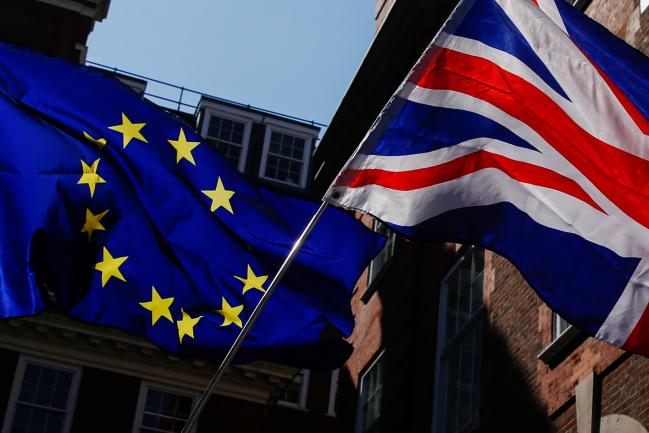Street Calls of the Week
(Bloomberg) -- U.K. and European Union negotiators have reached an outline deal on the divorce bill that Britain will pay when it leaves the bloc, the Telegraph reported, clearing a hurdle in talks and leaving the thorny issue of the Irish border as the last major obstacle.
While European national governments and their envoys in Brussels, speaking anonymously, told Bloomberg an agreement on the bill hasn’t yet been sealed, they said discussions are going in the right direction. EU leaders, rather than negotiators, have the final say on whether the offer on the divorce bill is high enough to unblock talks.
The U.K. government said “intensive talks” were ongoing to “build on recent momentum.”
Talks have been deadlocked, meaning negotiations haven’t even started on the crucial terms of trade that will apply once Britain leaves in just 16 months time.
Once the divorce bill has been settled, one more major hurdle -- and a more complex one -- remains before negotiations can move on to trade. The U.K. has until Monday to come forward with a proposal for how a hard frontier can be avoided on the island of Ireland when it becomes home to the U.K.’s new land border with the EU.
Prime Minister Theresa May and European Commission President Jean-Claude Juncker meet on Monday for a lunch that’s tipped as the setting for an agreement on the divorce. That would allow leaders at a summit in mid-December to declare that “sufficient progress” over separation terms has been made so that talks can start on the future relationship between Britain and its biggest trading partner.
The pound strengthened after the report.
Irish Obstacle
The divorce bill is a result of budget payments the U.K. signed up to while an EU member as well as other liabilities such as pensions that stretch into the future. While it’s unpopular with voters and rejected by some members of May’s own party, the Irish border issue is even more sensitive and will require political will and trust on all sides.
Ireland wants to avoid any kind of border on the island after Brexit and the European Commission is backing its stance. A policed frontier and customs controls will be needed somewhere, as the U.K. is leaving the single European market that allows the border now to be almost invisible. A return to checkpoints would stir memories of decades of violence and also harm the island’s economy.
Why Ireland’s Border Is Brexit’s Stubborn Puzzle: QuickTake Q&A
Dublin has an effective veto at this stage of negotiations and could stop talks moving on from the divorce issues to trade at the December summit if it’s not satisfied with Britain’s proposal on how to avoid a border.
Irish Foreign Minister Simon Coveney said U.K. and EU teams are discussing possible wording of a commitment on the border issue that would allow talks to move forward to trade.
May has to come up with a solution that’s acceptable to Dublin but also to the Northern Irish DUP party whose votes she needs in Parliament to govern.
Ireland would like the north to keep the same rules as the Republic after Brexit, but that would inevitably mean setting up a border between Northern Ireland and mainland Britain. The DUP’s raison d’etre is keeping Northern Ireland integrated in the U.K., and it rejects any kind of arrangement that would separate it from the mainland.
Crunching Numbers
The Telegraph said the two sides have reached an agreement in principle on the divorce bill, citing people it didn’t identify on both sides of the talks. The figure, left vague on purpose, will be 45 billion euros to 55 billion euros ($53 billion to $65 billion), the Telegraph said.
Two European government officials familiar with the talks told Bloomberg the bloc expects an offer of around 40 billion euros, without elaborating on whether this figure would suffice. Another EU government official said the range cited by the Telegraph is within the EU’s expectations.
The U.K. has been constructive on the financial settlement, according to another person familiar with the situation. They all declined to be named, as the talks haven’t been finalized and the matter is sensitive. EU officials have said the European side may help camouflage the bill, aware that it’s politically sensitive for May at home.
